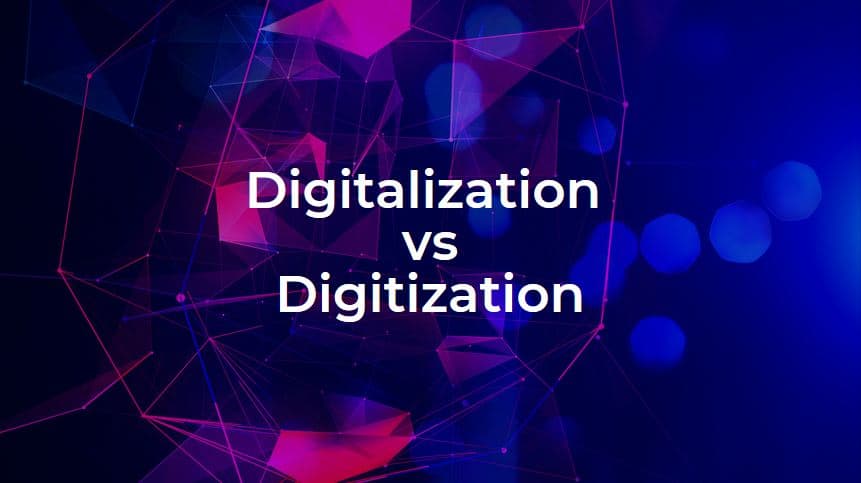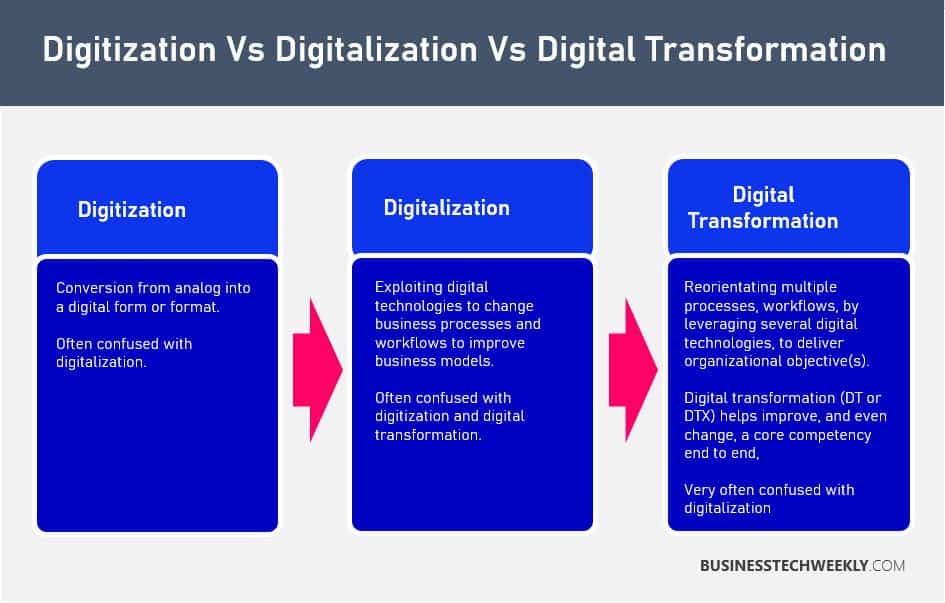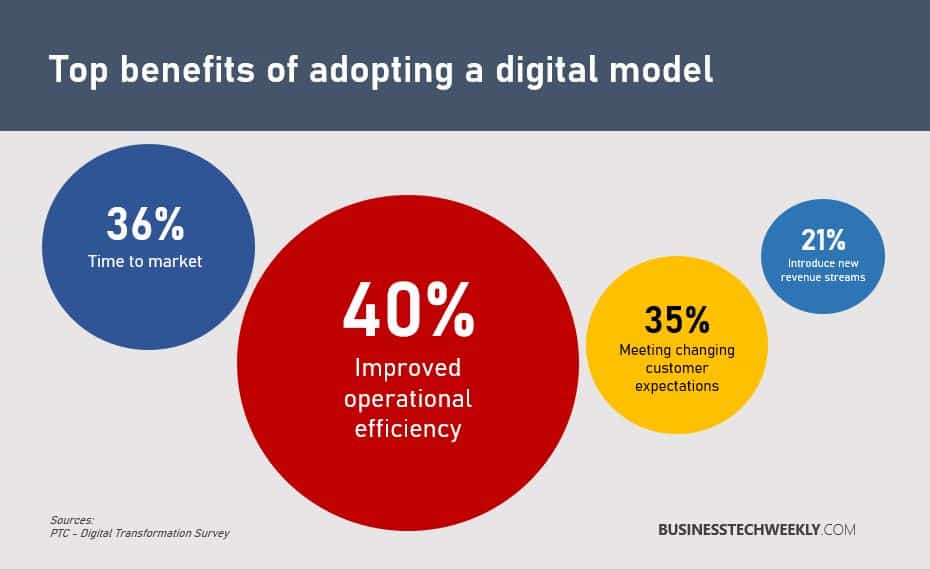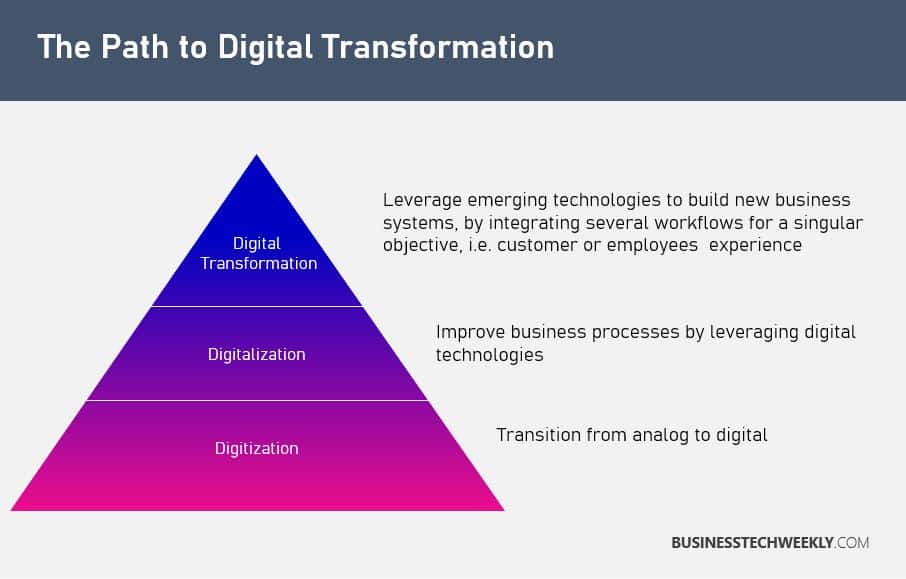Digitalization vs Digitization – Knowing the Difference

As we navigate through the digital age, several terms have emerged. Most of the time, these terms are used interchangeably. An example is digitalization vs digitization, and even digital transformation, which, while used interchangeably, are entirely different.
Primarily, these terms refer to different ways of responding to and adopting new technology. It is therefore crucial, that you, as a business, understand the differences when it comes to digitalization vs digitization.
Below are definitions and examples, allowing you to understand how these can contribute towards your digital transformation strategy.
On this page:
Digitization vs Digitalization vs Digital Transformation
Before we look at each of the terms individually, and their associated benefits, its important to understand how they relate to one another.
You can think of these terms as referring to different stages on the road towards digitally enabling your business.

Often, you will find the terms, digitization, digitalization, and digital transformation used interchangeably. However, it is not a case of merely comparing digitalization vs digitization.
When it comes to assessing digitization vs digitalization vs digital transformation, depending on your business’ current level of digital enablement, you will find that each has a different outcome, providing varying benefits to your business.
While digitalization is about applying technology to existing business processes and workflows, digital transformation means reorientating those processes in a new, digital way.
Consequently, digital transformation is far broader, with digitalization and digitization forming crucial components for any digital transformation initiative.

What is Digitization?
Digitization is the conversion of analogue data into digital form. It refers to taking information and encoding so that it can be processed, stored and transmitted electronically.
If you have ever converted your documents into electronic files, old photos into digital pictures or cassette tapes to MP3 files, you have involved yourself in digitization.
Advancement in technology has pushed us into the digital age, allowing us to capture photos with our smartphones, send messages from our laptops and find information on the internet. Digitization aims to make communication more efficient and faster.
Examples of Digitization
There are several examples of digitization. One of the most common examples is the conversion of handwritten or typed text into a digital format. Another example is changing bank statements sent via mail into a computer application.
Digitization is also seen when storing patient records of a hospital in computers instead of physical folders.
Digitization enables to create business value and efficiency, by converting analogue information into digital data, helping lay the foundation for a business to leverage that data.
Some other examples of digitization are:
- Converting your signature to an electronic format for signing documents online
- Scanning paper document into a digital document, such as PDF
- Converting from analog media such as VHS to digital formats such as CD, DVD or Blu-Ray discs
Most businesses have already adopted digitization and seen significant benefits in encoding their information to a digital format.
How has digitization benefited businesses?
Digitization has been fundamental in changing the way in which organizations conduct their operations.
Driving cost-efficiencies and increasing productivity, digitization has enabled businesses to move away from manual and analog tasks and activities, significantly reducing the time, cost and storage of those activities and their outcomes.
What is Digitalization?
Digitalization is leveraging technology to transform existing business models. Digitalization creates value by improving existing processes and business models to increase revenue and decrease costs.
Gartner echoes this, with their IT glossary defining digitalization as “the use of digital technologies to change a business model and provide new revenue and value-producing opportunities”.
While digitization is the conversion of analog to digital, digitalization uses digital data in a meaningful way through technology. Consequently, we can safely state that digitalization cannot happen without digitization.

Examples of Digitalization
Digitalization relies on digitization to improve business processes, making the data work for you. Digitalization converts processes to be more efficient, productive, and profitable.
Some other examples of digitization are:
- Using cloud computing to store and distribute documents
- Creating automated workflows, such as order fulfilment (for example, a business may have a website where once the customer places an order, a shipping label is created, the customer is invoiced, and the warehouse prepares the shipping)
- Centralizing customer data, such as contact information and product history, from several sources, which can support the business when diagnosing faults, identifying trends, and cross-selling products and services
Similar to digitization, many companies are likely to have already been exposed to digitalization. Many businesses already have one or more digitalized processes or workflows whether that be order fulfilment from an e-commerce site or customer history held in a CRM database.
How digitalization benefits business?
Small to mid-sized organizations leveraging digitalization can benefit since it helps increase the efficiency of operations while providing lower operating costs.
Digitalization has primarily been driven by cloud services, which offer a decrease in capital costs, whilst improving efficiency in parallel.
Such services offer the ability to access data easily, manage workflow and consolidate applications. Such facilities were previously limited to larger organizations that could afford the capital outlay for inhouse IT teams and hardware.
A large portion of consumers today are savvy digital users. Companies with a digital presence gain an edge at appealing to the audience.
Digitalization helps generate insights into customer behaviours. These insights and trends allow the effectiveness of promotional campaigns to be measured and to drive improvements to products and new revenue sources.
Digitalization vs digitization may mean different things and affect businesses differently. However, both are vital strategies in this modern age.

Understanding Digital Transformation
Closely tied to digitization and digitalization, the definition of digital transformation has evolved with the emergence of more and more digital technologies.
Digital transformation refers to the strategic aim of creating a digital business. As part of digital transformation, an organization will leverage all of the opportunities provided by digital technologies to change the overall approach of the business to create adaptability, and significantly improve performance and presence.

It’s important to note that the path to digital transformation is not linear, i.e. from digitization to digitalization, and then digital transformation.
When undertaking a digital transformation initiative, many organizations will experience digitalization projects borne out of digital transformation, potentially leading to digitizing business information.
See also: The benefits of digital transformation
Companies, particularly SMBs, opt for digital transformation to better orient themselves to customers requirements, and needs.
Digital transformation allows businesses to understand their customers better and leverage more ways of interacting with them. By leveraging digital technologies in such a way, businesses can sell new products and services, and reach new audiences whilst achieving greater integration across several workflows and processes.
Digital transformation includes all aspects of a company, regardless of their industry or level of digitalization.
Are you ready to digitally enable your business?
Digitization vs digitalization vs digital transformation? Central to these terms is the basic understanding that to remain competitive, businesses must adapt and evolve to take advantage of digital technologies.
Digitization encodes information, and digitalization improves processes and workflows. At the same time, digital transformation creates a digitally enabled business by using new or disruptive technologies such as artificial intelligence, IoT, robotic process automation (RPA), and so forth.
DIGITIZATION |
DIGITALIZATION |
DIGITAL TRANSFORMATION |
|
Goal |
Encoding information |
Information processing |
Leveraging knowledge |
Objective |
Convert from analog to digital format |
Automate existing business and operational processes |
Change organizational culture to deliver new services, products and new levels of customer engagement |
Activity |
Convert paper documents, analog media, microfilms to digital format |
Creation of end-to-end digital work processes |
Integration of multiple processes and workstreams to digitally enable the organization |
Tools |
Computers and conversion/encoding equipment |
IT Sytems and applications |
New and disruptive technologies, i.e. Robotic Processing Automation (RPA), Artificial Intelligence (AI), etc. |
Challenges |
Volume (Material) |
Cost (Financial) |
Resistance to change (Human resource) |
Example |
Scanning paper-based registration forms |
End-to-end electronic registration process |
Entirely electronic, from registration to individually tailored content delivery |
As digital technology develops, it’s crucial for all businesses, particular SMBs, to be understand how their businesses are impacted by these technologies, and how to stay ahead of the competition by appropriately leveraging digitization, digitalization and digital transformation.

